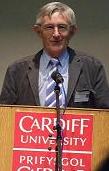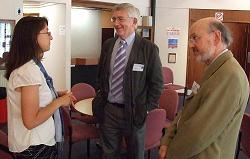CHASE
CHASE
2010 Conference Report
Cardiff University June 23-24, 2010 :
'Music for Stringed Instruments: Music Archives and the Materials of Musicological Research in the 19th and Early 20th Centuries'
 c
c 

[L-R: Robin Stowell; Peter Collyer, George Kennaway, Robin Stowell, Clive Brown; Marie Sumner Lott, Robin Stowell, and Clive Brown]
The conference attracted speakers from the UK, New Zealand, Australia, the USA and Germany, who gave papers on an impressively wide range of topics using an equally wide range of methodologies. The call for papers resulted in a full programme (14 papers plus a performance), and since we were able to avoid having parallel sessions it meant that most people heard every paper and found much to stimulate their own research. Several students also attended, and we were fortunate to have the support of the Music & Letters Trust to assist with their costs.
A group of speakers from the Royal Academy of Music contributed fascinating presentations focussing on the interaction between performer and printed score, with reference to Fauré’s approach to writing for string instruments (Neil Hyde), Skalkottas’s background as a violinist and its influence on his compositional technique (George Zacharias), W. H. Squire’s use of portamento (Oliver Gledhill), and an attempt at recreating Joachim’s performance style on his own ‘long pattern’ Strad (Peter Sheppard Skaerved). Among the more diverse topics discussed were Russian avant-garde viola compositions by Roslavets and Vasilenko from the 1920s (Elena Artomonova, Goldsmiths), and editions and performance practice relating to the César Franck violin sonata with special reference to Ysaye (Dr. Ilias Devetzoglou, Leeds). Both of these papers included extremely impressive demonstration by the speakers in their own recorded performances. Nancy November (Auckland) discussed the evidence of early recordings of Beethoven quartets and showed that on the whole recorded performances are not tending towards the uniform and the homogeneous, as is often asserted. Bonnie Jane Smart (Melbourne) gave a delightful paper on the great 19th-century English cellist Robert Lindley, a particularly thoroughly researched paper delivered with charm and humour.
A significant number of papers concentrated on aspects of German editions in the 19th century. Clive Brown (Leeds) spoke with infectious enthusiasm about a recently discovered collection of music bearing substantial handwritten annotations by Ferdinand David. David Milsom (Huddersfield) showed how aspects of Joachim’s performance practice could be inferred from editions prepared by his pupils Schnirlin and Auer, and illustrated his talk with excellent demonstrations. Dr. George Kennaway (Leeds) compared four quite different 19th-century editions of Mendelssohn’s cello sonatas. Peter Collyer illuminated the concept of a ‘Leipzig school’ of publishing and editing, the subject of his PhD research at Leeds, with reference to the violist Friedrich Hermann. Prof. Robin Stowell (Cardiff) gave a fascinating demonstration of what can be gleaned from a comparative study of David’s edition of Mozart’s violin sonatas, which stimulated lively discussion about the interpretation of earlier sources for these works.
Marie Sumner Lott (Pennsylvania state) shared her recent researches in German publishers’ archives, which cast an entirely new light on what amateur musicians actually played through the 19th century, and suggested many possible avenues for future research into the mechanics of music publishing. Robert Pascall (Nottingham) gave the conference keynote lecture on aspects of Brahms editing – a remarkable presentation which drew on his unrivalled experience in this field and his close association with the Neue Brahms Ausgabe, and characterised equally by his modesty and enthusiasm.
The LUCHIP (Leeds University Centre for Historically Informed Performance) quartet (Clive Brown, David Milsom, Duncan Druce and George Kennaway), now the Ferdinand David Quartet, performed Brahms’s quartet op. 51 no 1 in classic German style which prompted much interested discussion of issues such as the use of portamento. The conference dinner, organised by Robin Stowell, was also a great success, and indeed the entire event was extremely well organised by him and his very able team of assistants.
[G.K.]

